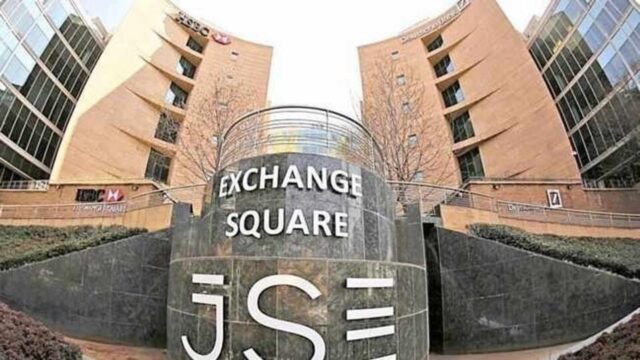MARKETS ON MONDAY: The news that South Africa’s inflation rate was 5.1% year-on-year in December and 6.0% for 2023, better than expectations of 5.3% for December and 6.1% for 2023, has come as good news for markets, writes Chris Harmse.
EQUITY markets on the JSE turned around last week after a strong downward trend during the first three weeks of the year.
The news that South Africa’s inflation rate was 5.1% year-on-year (y/y) in December and 6.0% for 2023, better than expectations of 5.3% for December and 6.1% for 2023, came as good news for markets.
Food and non-alcoholic beverages increased by 8.5% (y/y). This is the third month in a row that it has increased at a lower rate. Transport (including fuel) had increased by only 2.6% on the previous December, as fuel itself decreased by -2.5% (y/y). The producer price inflation rate (PPI) increased by 4.0% in December (y/y). This is also much lower than the 4.5% rate in November and better than the expected rate of 4.3%.
Although consumer prices (CPI) and prices at the factory gate (PPI) increased at a lower rate last month, the Monetary Policy Committee (MPC) of the SA Reserve Bank, as expected, decided on Thursday to keep its repo rate at 8.25%.
The MPC in its press release said: The December survey of the Bureau for Economic Research shows average inflation expectations increased to 5.7% for 2024. Achieving permanently lower inflation and interest rates requires inflation expectations to be closely anchored to the mid-point of the target band. Against this backdrop, the MPC decided to keep the repurchase rate at its current level of 8.25% per year. The decision was unanimous. (Midpoint inflation is 4.5%.)
The rand exchange depreciated strongly by 11% in 2023 due to worries of the global environment and various South Africa-specific factors, including load shedding, increasing government debt, sluggish growth, and lower commodity export prices.
The more hawkish mood of the US Federal Reserve since the beginning of the year led to the rand to depreciate by another 3.34% during the first three weeks of January to R19.19 against the dollar.
The better-than-expected inflation rate data, as well as some movement into more risky developed markets equities, like South Africa, contributed to the rand starting to recover from last Tuesday. The currency traded on Friday at the JSE close 43 cents lower on R18.76 against the dollar.
Equity prices on the JSE followed world share prices and recovered strongly last week. Domestic share indices were also helped a lot after the Chinese government last week approved 115 new video game titles in the first month of 2024, the largest batch of approvals in 18 months.
This had a big positive effect on Tencent, the subsidiary of Naspers, on Chinese stock markets. It in turn caused Naspers to increase by more than 11.0% and Prosus (8.7%) over the past seven days.
The all-share index increased by 2 423 points (3.33%) on the previous Friday close. The Top 40 index for the week gained 3.42%, while financials (FIN15) increased by 1.28%. The resources 10 index had the best week of the major indices and increased by 5.2%. The all-share industrial index improved by 3.7%.
This coming week all eyes will be on the US Federal Reserve decision on US rates. The expectation is that the Fed will keep its bank rate unchanged, but market players await the tone of the press release, as some indication of when the next move (especially a possible cut) can be expected.
In the US, share prices continue to move stronger, given the resilient economy and better prospects for company earnings as the earnings season kicked off. The Dow Jones Industrial index increased steadily last week with 0.5% and trades 1.1% higher since the beginning of the year.
The S&P500 ended last week 0.77% higher and gained 3.1% over the year-to-date (YTD). The tech-rich Nasdaq composite index continues its strong rally, gaining 0.4% last week and is 4.1% higher since the beginning of the year.
The yield on the 10-year US Treasury note increased further last week from 4.10% to 4.15% on Friday, its highest this year, indicating that the Fed will not reduce interest rates on Wednesday.
This coming week, local markets will await the announcement by the National Treasury of its budget balance for December 2023. In November the deficit of the central government was R17.807 billion. It is expected that the deficit for December will be more than two times higher at R46bn.
Statistics SA will release the Balance of Trade figure for December on Wednesday. It is expected that the trade surplus will come down to R15bn against the R21bn recorded in November.
Absa will publish its latest Manufacturing Purchasers Managers Index on Thursday. Naamsa will also release the new vehicle sales for January on Thursday.
On global markets, apart from the US Fed’s decision on interest rates on Wednesday, US non-farm payrolls and the unemployment rate for January will be released on Friday. Most developed countries will publish their various PMIs.
The Bank of England will announce its interest rate decision on Thursday. The EU and various individual members in Europe will release their preliminary gross domestic product growth rates for 2023 quarter four.
* Chris Harmse is the consulting economist of Sequoia Capital Management.
– BUSINESS REPORT








